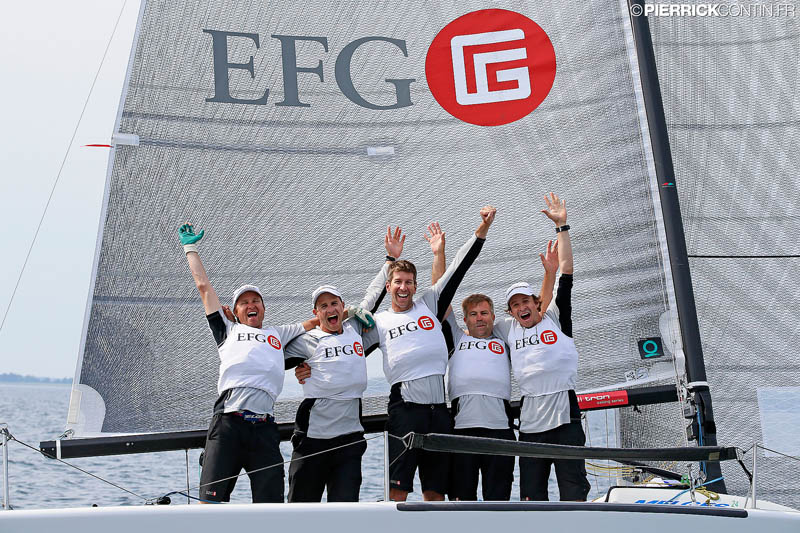Scuttlebutt Sailing News: Melges 24 Worlds: Winner’s Debrief
August 25, 2015 - Winning the Melges 24 World Championship is never easy. The class attracts the best sailors, and after 20+ years, there are few tricks left to exploit. So when 2008 US Olympian Christopher Rast dominated the 2015 Worlds, beating the 95-boat fleet WITH A RACE TO SPARE, Scuttlebutt editor Craig Leweck had to find out how he did it…
 EFG Sailing Team SUI684 with Christopher Rast at the Melges 24 Worlds 2015 in Middelfart, Denmark - photo Pierrick Contin
EFG Sailing Team SUI684 with Christopher Rast at the Melges 24 Worlds 2015 in Middelfart, Denmark - photo Pierrick Contin
What proved to be valuable regarding your preparation?
We didn’t really have enough time to prepare “properly”, but our team (René Schenk, Pade Zaugg, Pavel Tolonen, and Udo Moser) had good people that infused some new ideas in all aspects of our sailing. This also included Nikolay Kornev early on in the season and Dave Hughes with Oli Bone during our second Italian event this year, which we won coincidentally. So bringing in new people and their ideas proved very beneficial.
Starting in a big fleet requires a different approach. Did you have a specific plan for getting off the line?
It’s definitely different starting on such a long line. We had two basic starting plans. The first one was based on starting in the middle of either side of the line (there was a mid-line boat). This takes advantage of being covered and therefore not getting called over.
Sounds a bit risky, but it’s pretty difficult to call boats that are over somewhere in the middle of the line when you can’t actually see them. Ask any PRO! That said, we always started properly, behind the line at the gun
The second plan was starting right next to the mid-line boat, basically keeping our options open and having a clear grip on not being over the line early.
With such a long start line, how does that impact pre-start logistics and first leg tactics?
Yes, it was long, but in the end you still need to know which side of the course you want to play depending on current, breeze and how the fleet and the key players are behaving. If we weren’t sure on how things were going to play out, we would start in the middle and keep looking for indicators. In these situations you really have to have solid boat speed in order to stay within striking distance.
Does boat set-up or sailing technique change in such a big fleet?
The added chop at the start and leeward gates, plus the importance of holding a lane does influence your set-up, but as soon as you have a clear lane you go back to sailing VMG. It’s nice to be able to change the rig on the fly on the Melges 24, so active rig changing is rewarded. I would also often ask to go looser on the rig on the downwind legs, so that we would have more power around the gates in all the confused sea state and bad air.
There aren’t many 95-boat Worlds. To what do you attribute such a big fleet?
Primarily location. The fact that the Worlds were located in Central Europe (more or less) ensured that we would have plenty Germans and Scandinavians showing up. On top of that the organization committee did an excellent job in the lead up, getting people rallied up, keeping everyone informed and offering a really nice venue with plenty of social interaction!
The class endured a lengthy debate regarding the lifeline taco hiking’ that was deemed fast but not very popular. A decision was made to shorten the stanchion height to improve comfort. How has this worked out?
Really well! I can’t really tell if it has affected the actual performance of the boat, but the fact is that it has improved the morale of everyone hiking! It’s still not a lot of fun, but it’s way more manageable, especially for the crew members hiking right next to the stanchions.
The Worlds had a big Corinthian fleet. The class has had a big pro influence in its history but is that now balancing out?
It’s great to see the resurgence of the Corinthian fleet, although it always has been pretty big in this class. Pros will keep on dipping their toes into the Melges 24 fleet to see how they far against each other, but it’s a pretty tough fleet. Even after 21 years since the Melges 24 was conceived, it’s still the most fun, fastest boat to sail in its type of class. This is a testament to the design and the workmanship of the Melges team. I’m looking forward to the next 20 years!
